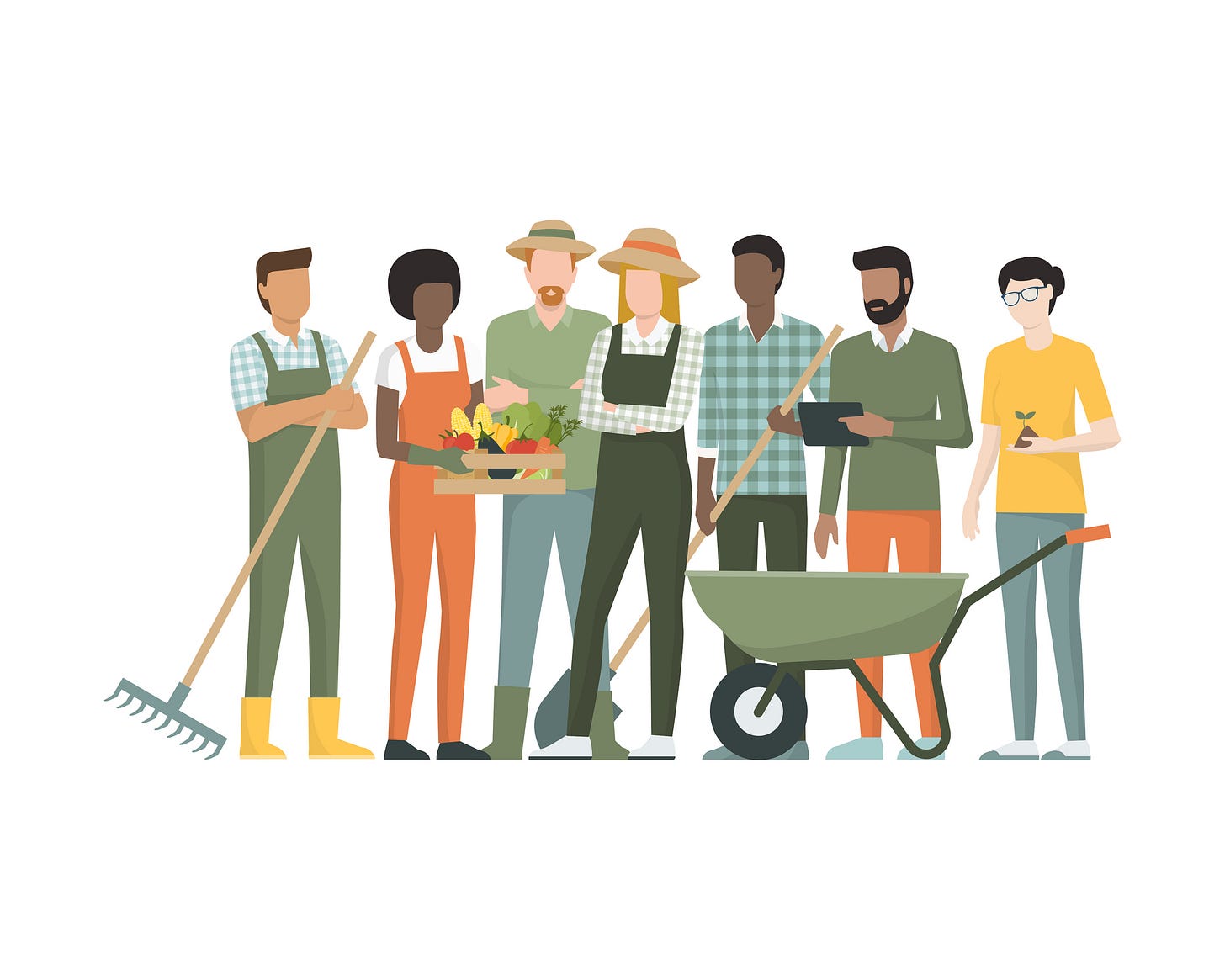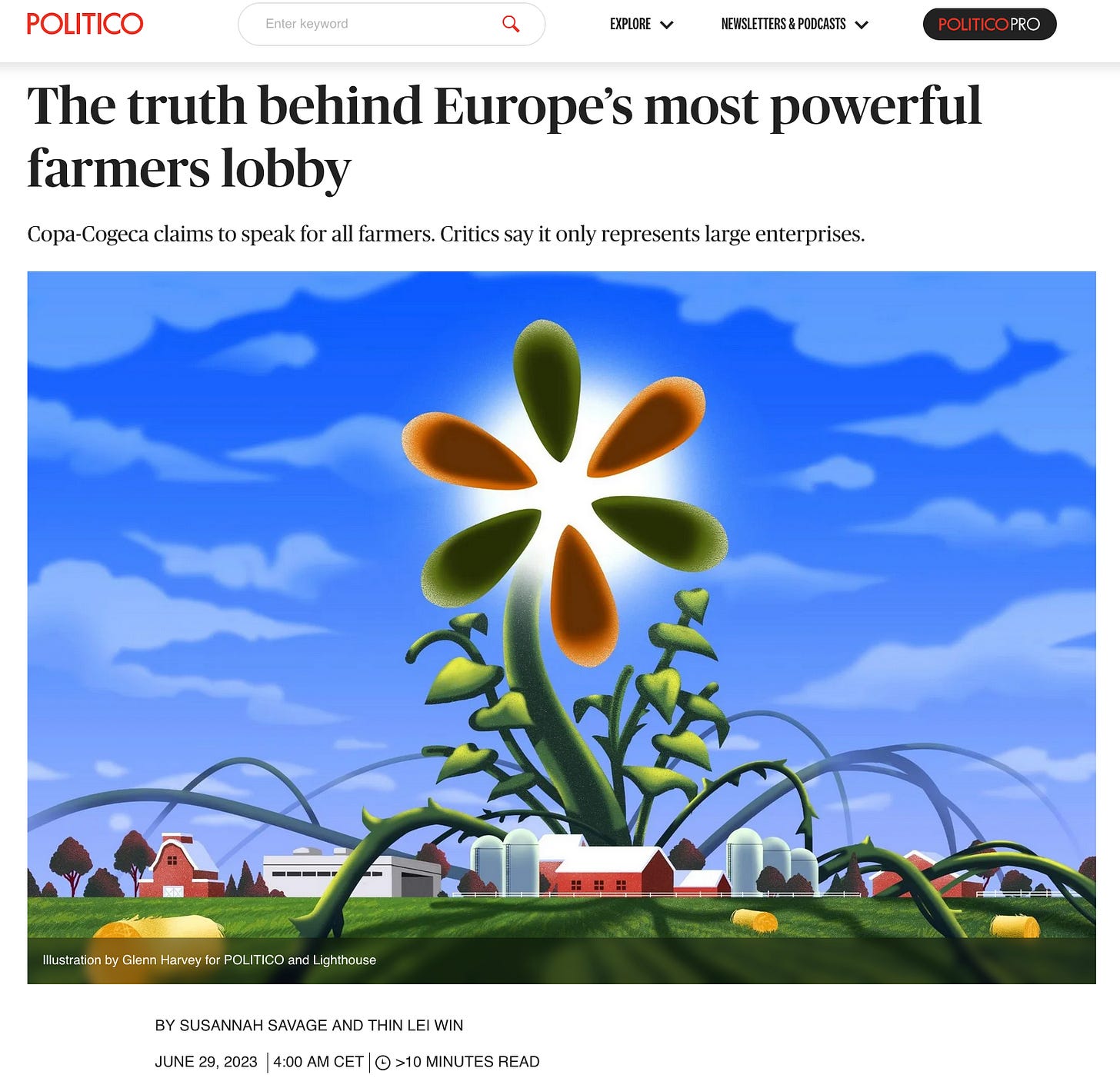In the Name of the Farmers
Who gets a seat at the Brussels table and do they truly speak for the people they say they represent?
I’m focusing this issue on the latest investigation from Lighthouse Reports’ Food Systems Newsroom with half a dozen media partners. It shines a spotlight on farm unions in a number of European countries and on Copa-Cogeca, the biggest granddaddy lobbyist of them all in Europe.
We spent more than 6 months working on this - almost a year if you count the time when it was first conceived - and spoke to nearly 120 people, half of whom are farmers. Here’s what we found. If you find it insightful, please share the original reports far and wide. Thank you.
Katja Temnik’s life used to revolve around basketball, captaining Slovenia’s national team and playing in Italian and Spanish leagues. She never dreamt she’d be an advocate for the kind of agriculture that cares for biodiversity and the health of ecosystems.
But after retiring from professional sports in her 30s, Katja took over her mother’s herb farm and discovered that policymakers were sidelining organic farmers. So the 44-year-old decided to use her sportstar status to speak out.
Last December, during the annual EU conference on the future of agriculture, Temnik warned the assembled parliamentarians, bureaucrats, lobbyists, and farmers that the increasing emphasis on technology-driven food production was wrong.
Her 95-second speech was well-received but Temnik, voted Slovenia’s most innovative young farmer in 2019, reflected later on the disconnect she felt between the decision makers and farmers like her: “They are completely isolated from reality or what people who actually live and work with land need and feel."
This is a refrain I heard repeatedly from many farmers I spoke to during the course of our investigation.
In 2016, Janet Power, also 44, quit the corporate world to do something that aligned more with her personal values, which was to create “a more sustainable living system for all”. She became a farmer.
The one-hectare Gorse Farm in southeast Ireland, which she co-founded, produces fresh, leafy greens for the local community and for the first five years, made a profit despite receiving next to nothing in terms of policy or monetary support. She now receives a small amount of EU subsidy under the Common Agricultural Policy (CAP).
But Janet, who worked for the pharmaceutical giant Pfizer for nearly nine years before growing food, is concerned about the future.
“We are experiencing atypical weather patterns,” she said, referring to drier and warmer seasons, plants blossoming early and frost appearing late.
“Growers who would never have needed irrigation systems have invested (in them). I am updating my irrigation system and stockpiling mulch, again with the prediction that we will have a prolonged period without rain.”
Some 1,700 kilometres away in northern Germany, David Peacock, 35, has similar concerns, even though his farm differs significantly from Janet’s both in terms of size and produce.
“In the last five or six years, we’ve received even less rain than normal. That has been challenging,” said the founder of the successful and much-praised Erdhof Seewalde, an 111-hectare mixed livestock farm he runs with his family.
The diversity of crops and animals and a focus on keeping soils healthy helped Erdhof weather these conditions, but the larger question of agriculture’s contribution to and vulnerability from climate change worries David, who keeps a strict watch on the amount of fossil fuels that goes in and comes out of the farm.
So Near, Yet So Far
David told me he’s frustrated with what he sees as lacklustre efforts by policymakers and big farm unions to tackle this challenge.
“I do not feel connected with them because the way they farm and what they're doing is destroying the planet,” he said, referring to Copa-Cogeca, the little-known, but highly influential Brussels-based farming lobby group which has steadfastly opposed reforms to make European agriculture more sustainable and more resilient to climate impacts.
“I know it is possible to work differently. So I'm quite critical of what they're doing and of the structures behind the whole thing. I don't understand why they do not play a part in trying to change how they farm and why they don't realise their responsibility,” added David.
In terms of geography, de Groentelaar co-operative in Pepingen, Belgium, is much closer to the centre of power in Brussels. It takes less than an hour to drive from the European quarter to get to the farm, but Tijs Boelens, a 37-year-old organic vegetable producer there, sees a massive chasm between him and traditional farm unions and feels left out by policymakers.
“We are not at all seen. We don’t count because we don’t have money,” he told me over a Zoom call during an afternoon break, adding that he is angry at policies at regional, national, and European Union level, which he said are very much focused on large-scale, industrial, intensive farming.
“I've been sweating the last four years. One year we were drowning (from floods) and then there were three years (of dry seasons). We almost lost our minds during summer just trying to cultivate vegetables,” said Tijs.
Yet policymakers in Brussels and farm lobbies don’t seem to have realised this, he added.
So if national governments and policymakers in the European Union aren’t listening to these farmers, who are they listening to?
This 2019 article by the the New York Times provides a clue:
“As long as there has been farm money, Copa-Cogeca, Europe’s largest organisation for farmers, has swayed where it goes. European leaders have historically treated the group not as mere recipients of government money, but as partners in policymaking.”
“Much has changed in recent decades: Environmental concerns have become a priority and farming has shrunk to 1 percent of Europe’s economy. Yet even today, Copa-Cogeca enjoys special access that would make others swoon.”
Does The Emperor Have Clothes?
So who exactly is Copa-Cogeca? It’s the biggest, oldest, and most powerful farm lobby group in Europe, a union of unions whose establishment dates back to the birth of Europe’s agricultural subsidy programme some six decades ago.
Copa-Cogeca was set up in 1958-1959 at the inception of the Common Agricultural Policy (CAP), a policy linked to the post-war ideal that Europe should never go hungry again. Major national farm unions in EU member states are their members and Copa-Cogeca portrayed itself as the voice of European farmers.
One way they do this is to claim, on its website, that the group “represents over 22 million European farmers and their family members” - which would mean every single farmer in the bloc .
These numbers give them legitimacy, which in turn give them that privileged access to three key EU institutions - the Commission, the Parliament, and the Council.
Check out this piece from our media partner Politico that gives more details about this access, as well as how they use it, which includes a veiled threat against a member of the European Parliament over his attempts to include plant-based milk in the school feeding scheme for children with intolerance and allergies.
But but but…. that 22 million figure? Mostly aspirational. “Technically speaking, it’s less than 22 million,” Pekka Pesonen, the head of Copa-Cogeca, told Politico.
In fact, membership data for many of Copa-Cogeca’s affiliates is either unavailable, unreliable or unrealistic.
Not only that, the group is losing touch with farmers, particularly the young and those engaging in small-scale agriculture, who make up the bulk of European agriculture and who play an important role in feeding local communities.
To reach this conclusion, we submitted Freedom of Information requests, trawled through thousands of pages of annual reports, academic papers, news articles, and multiple surveys, and came to grips with the intricacies of agricultural policymaking in the EU.
We spoke to former insiders and existing members of Copa-Cogeca, who said the farm lobby represents the interests of big farms and agribusinesses rather than small-scale, independent farmers.
We spoke to young farmers like those mentioned above who feel completely disconnected from Copa-Cogeca.
We spoke to EU officials and policy experts who admit the lobby represents a large-scale, industrial farming subset of farming, and lobbies aggressively to get its way.
We spoke to lawmakers and environmentalists who say it is waging war on nature.
Show Me The Numbers
For example, Copa-Cogeca used food security concerns stemming from Russia’s invasion of Ukraine to push back efforts to make farming more sustainable, many of which are laid out under the Farm-to-Fork Strategy, a key component of the landmark European Green Deal.
Its lobbying managed to delay crop rotation and fallow land requirements and postpone ambitions to halve pesticide use by 2030 despite public and academic support for cuts, and it is now opposing a key law to restore nature.
In fact, U.K. think tank Influence Map identified Copa-Cogeca as one of the most engaged and “hostile” when it comes to lobbying against biodiversity policies and said the lobby used the war in Ukraine for “opportunistic lobbying” to push “long-standing policy asks”.
What Copa-Cogeca says has sway because, like I said above, they’re seen as the representative body of European farmers.
But as our Romanian media partner, Libertatea, reported, the Alliance for Agriculture and Cooperation (AAC), the Romanian member of Copa-Cogeca, represents 3,500 farmers in a country with nearly 2.9 million agricultural holdings.
Meanwhile in Denmark, the national Copa Cogeca member, Landbrug & Fødevarer (Danish Agriculture & Food Council), claimed an increase in membership in 2021 - by 5,000 farmers - compared to five years ago. This was remarkable, because European and national trends show the number of farmers are going down.
But of course, all is not as it seems. Read the story from our Danish partner, Danwatch, to find out more.
In Spain, El Confidential found that the farming lobby’s affiliates account for 40% of Spanish farmers, but gobble up 75% of the government budget for farm groups to participate in EU discussions.
There’s another number I need to talk about. We discovered that governments in Spain, Poland, and Romania pay for their farm unions’ to become members of Copa-Cogeca, amounting to about 1.4 million Euros a year in total.
And I have reason to believe these aren’t the only countries footing the bill. If you know more, please drop me a line!
The Iron Triangle
This is one of the new terms I learnt during this investigation. It refers to the legislative, the executive and interest groups in Brussels who have close relationships with each other and a strong grip on agricultural policy making.
This chummy, closed loop process among a small group has been dubbed “The Iron Triangle”.
It is the reason for the bloated budget of CAP which has benefited large landowners at the expense of small- and medium-sized farmers. It is also the reason why much-needed environmental reforms for agriculture have not happened.
It’s also the exact opposite of what we need to do to ensure a sustainable and healthy farming future.
“It is very important for us to place agriculture in a broader societal debate because it has impacts on climate, biodiversity, etc,” said Benoit Biteau, French MEP, vice-chair of the parliament’s agriculture committee and a farmer himself.
“So it shouldn't be a debate between agricultural specialists but also with citizens.”
Farmers are also seeing how policies defended by Copa-Cogeca are affecting their income, he added.
“If some of them are winning from the system, the others struggle against bankruptcy in harder working conditions. Copa-Cogeca can blame environmental policy as much as they want but fact is that it is the direct result of the liberal and productivist orientation they promoted."
We put detailed questions to both the European Commission and Copa-Cogeca, and our media partner Politico also interviewed Pesonen.
The Commission said long-term sustainability of food systems is fundamental and the transition needs to continue and that they welcome any organisation to share their thoughts, not just Copa-Cogeca.
Pesonen told Politico that he is not against efforts to green agriculture, plant-based alternatives, or even The Green Deal, but that the market and investment have to be there and it must not impact food security.
But he also doesn’t see much of a future for small farmers. Oh and did I already mention he also admits the lobby group doesn’t really represent 22 million farmers? Check out the Politico piece for more.
When, not If
Even Pekka himself admitted that time is running out to adapt to climate change.
“If we are lucky, we have 10 years,” he told Politico.
Yet, his group continues to lobby against green legislation, a position that one anonymous EU official calls “this ostrich attitude” that is “hugely irresponsible”.
Because, the longer we drag our feet on transforming our food systems, the shorter the window there is to do this. Because it is “a question of survival, for farmers, all of us, and the rest of the living world”, said Ariel Brunner, Head of EU Policy for BirdLife Europe & Central Asia.
“Current farming practices are at the heart of the biodiversity and climate crisis. We are losing soil and pollinators, depleting water resources, and wiping out natural pest control and adding GHG instead of increasing the carbon sink.”
“It’s not about becoming “more environmentally sustainable”. It’s about reinventing farming so that we can keep producing food and surviving on this planet.”
Because when climate change spirals out of control, “Farmers will be among the worst hit,” he said.
“When droughts, floods, heat waves and pest outbreaks wipe out farmers' livelihoods, we’ll see a lot of terrible human suffering. And I am really afraid that at a certain point governments will be overwhelmed and won’t have the money for compensations any more. Instead of a managed and supported transition we’ll see bankruptcies, suicides, lives lost to extreme events.”
Further Reading
Europe’s Potemkin Lobby - Lighthouse Reports
The truth behind Europe’s most powerful farmers lobby - Politico
Ordinary farmers in Europe are left in the lurch by governments, which in turn help a little-known but extremely powerful lobby group in Brussels (Part 1) - Libertatea (Romanian)
Part (2) - Libertatea (Romanian)
The agricultural 'lobby' pampered by Spain and Brussels that slows down the EU's green policies - El Confidencial (Spanish)
This is how the EU's agricultural lobby fights for the big farmers and fights green legislation - Danwatch (Danish)
Copa-Cogeca, an agricultural lobby the Polish government supports with millions. Who is behind it? - OKO.Press (Polish)
And behold my debut on TikTok talking about this investigation! It’s a 3-parter no less. Below is the first part. Here are Part 2 and Part 3.
As always, please feel free to share this post and send tips and thoughts on mastodon @ThinInk@journa.host, my LinkedIn page, twitter @thinink, or via e-mail thin@thin-ink.net.









Digging into the farm lobby and corruption is a great line of attack. I hope you can keep it up. It's even worse in the USA - much worse. But this exposure is important. Thanks and keep it up.